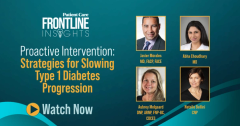
Key Insights and Final Thoughts on Screening and Management of T1D
Panelists discuss key insights on the importance of early screening for T1D, the role of antibody testing in identifying at-risk individuals, and the need for timely intervention to preserve ß-cell function and optimize long-term management strategies for better patient outcomes.
Episodes in this series

The following Frontline Insights transcript has been edited for clarity and length.
Javier Morales, MD: I want to ask the audience, did you find this discussion helpful in understanding type 1 diabetes staging and management?
Abha Choudhary, MD: While the audience is responding, I’d like to share that at our pediatric center, we've made the decision to conduct all infusions, including on weekends, in our infusion center. We've managed to staff it appropriately, so if there’s anyone in the Dallas area in need of these services, please don’t hesitate to refer them to us.
Morales: Absolutely, it's important to spread the word, and we’re all in this together to support our community. It seems that most of our audience found this discussion quite insightful. Now, I have another question for our viewers: What was the key takeaway regarding type 1 diabetes staging and management? Please select all that apply. Was it:
- Acknowledging the staged progression of type 1 diabetes?
- Identifying the appropriate referral pathways for type 1 diabetes staging?
- Understanding the importance of recognizing high-risk patient populations?
- Recognizing the role of antibody testing in assessing type 1 diabetes progression?
- Gaining insight into the ability to delay the diagnosis or progression of type 1 diabetes?
Please select all that apply.
And it looks like 100% of you selected the ability to delay the progression of type 1 diabetes. Bravo to everyone, as that was our main message. It’s also encouraging that most of you selected all the choices, except for identifying the appropriate referral pathways for type 1 diabetes staging. This is a key point—recognizing the disorder, screening for it, and knowing the next steps if you get a positive result.
To close, I’d like to ask our presenters to share a few final thoughts. From my perspective, I learned a lot about screening, the relevant antibodies to use, and the proper course of action when you receive a positive test result. Natalie, would you like to share your closing thoughts?
Natalie Bellini, DNP, FNP-BC, BC-ADM, CDCES: I think we need to fully embrace the idea that screening can save lives and reduce the risks of DKA. We should make screening a routine part of patient history. Ask questions like, "Do you have siblings? Do they have diabetes? What kind of diabetes do they have? Do they take insulin?" If the answer is yes, start screening these individuals. Partner with an endocrinology practice to support you, and don’t hesitate to ask for help. I’ve never encountered a practice that’s unwilling to help—there are always spots available for those who screen positive.
Morales: Aubrey, what are your closing thoughts?
Aubrey Molgaard, DNP, ARNP, FNP-BC, CDCES: I completely agree with Natalie. I work with adults, and we have spots available every day. When someone identifies as at risk, we get them in quickly. It's life-changing, and we can make a significant impact on disease progression. Screening is essential. Collaborate with us—we're here to help and partner with you.
Dr. Javier Morales: Finally, Abha, do you have any final words?
Abha Choudhary, MD: Once a patient enters the early stages of diabetes, whether stage one or stage two, progression to stage three is inevitable. So, screen it like you mean it! If you find antibodies, send them over to us—we have appointments available in our pediatric clinic. We will see your patients quickly. Thank you.
Dr. Javier Morales: "Screen it like you mean it!" I love that. It’s not just a great catchphrase; it’s a reminder that screening is crucial—not only for type 1 diabetes but for many other chronic conditions. Thank you all for your attention and for engaging in this discussion. We hope you’ve learned more about how we can delay the progression of type 1 diabetes in stage two. Stay tuned for more episodes, and have a wonderful evening. And remember, screen it like you mean it.
Newsletter
Enhance your clinical practice with the Patient Care newsletter, offering the latest evidence-based guidelines, diagnostic insights, and treatment strategies for primary care physicians.































































































































